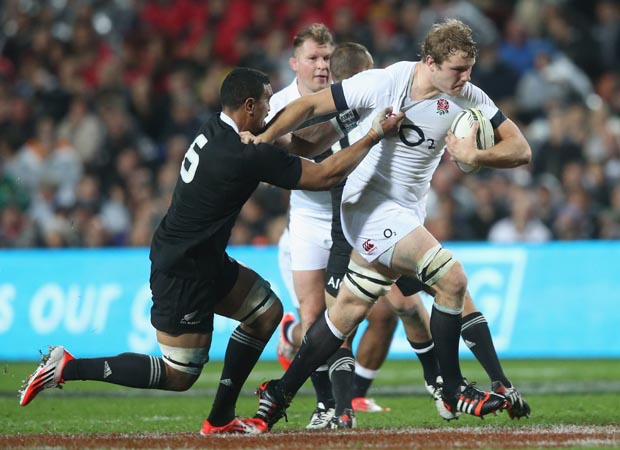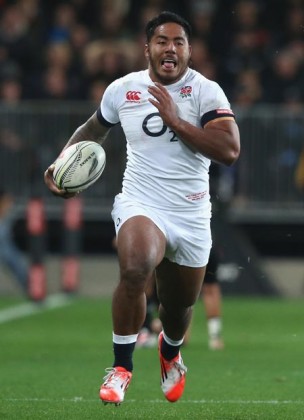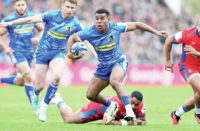 The biggest mental plus that New Zealand have over England at the end of their three-Test summer series is Julian Savea's try right at the end of the third Test. By keeping the ball for one and a half minutes and running England off their feet before Savea scored, New Zealand made a big statement. They were saying, “forget about your skill levels not being as good as ours, we can take you out when it comes to fitness as well”.
The biggest mental plus that New Zealand have over England at the end of their three-Test summer series is Julian Savea's try right at the end of the third Test. By keeping the ball for one and a half minutes and running England off their feet before Savea scored, New Zealand made a big statement. They were saying, “forget about your skill levels not being as good as ours, we can take you out when it comes to fitness as well”.
The crux of England making progress after the tour of New Zealand rests on attitudes within the coaching group to selection – including replacements – and fitness.
It's a given that most international players will go at it with as much intensity as they can, whether it's for 50, 60 or 80 minutes. But at international level the difference between success and failure is very often small margins – as England discovered against the All Blacks in the first and second Tests.
One area the England coaches must look at in detail is their bench policy. The big question where replacements are concerned is whether the guy coming on is going to be as effective as the bloke who's been up to speed for 50 minutes? Remember, a second wind is what you strive for in a game, and often it comes after a good scrum, a strong carry or destructive tackle.
I question the need for the number of substitutes we see – and that's not just England, it's all teams. Sometimes you wonder whether there are any coaches left out there who have the courageto keep a starting team on for the entire 80 minutes.

With the amount of analysis that goes into players these days, whether it's VO2 capacity or technique, you are left wondering just how much analysis goes into the impact that a bench player has. At the moment I am not convinced that most subs are in a better position physically and mentally than the blokes who've been on for 50 minutes.
It's a question that England need to answer because it is directly linked to whether the squad is as fit as it should be. You get the impression that New Zealand are the fitter side because they are able to play with pace and intensity for longer than any other team. They backed themselves to do that, because they believe they are fitter.
Intensity requires fitness. The sort of fitness that means you can counter ruck in your own 22 with the same intensity in the 80th minute as you had in the fifth minute.
It is a given that fitness levels also impact on skills. When you are tired your skills are put under far greater pressure, and you are much more likely to make mistakes when you are fatigued.
So, one of the big challenges facing head coach Stuart Lancaster is to get his players fitter. The first thing is for the players to accept responsibility. Just as Jonny Wilkinson was focused totally on his aim to be the best kicker in the game, every player in the England squad has to do everything they can to get there. Lancaster can put in the conditioning framework and expertise, but it is up to the players to do the work.
As a player when you go on a tour and you lose, you don't feel good. But if I was an England coach, or player, though disappointed, I would still have great belief that at Twickenham this autumn England have the ability to beat any side.
The reality is that although New Zealand were better over the three Tests, the margins were not massive. No one can tell me that England could not have won those first two Tests, and that the big difference between the teams was that New Zealand took many more of their opportunities.
New Zealand thrive on their ability to really drive home their advantage and put a team down by a big score. For England to score two tries in the last ten minutes against the All Blacks, as they did in the second Test, is a big hurdle to overcome against the best side in the world. You will not find New Zealand saying they let it go at the end as some sides do – their policy is always to punish the opposition.
The England head coach's biggest job is selection, and this is going to become harder for Lancaster the more competitive his squad becomes. New Zealand was a big learning experience for Lancaster in particular, not least when he stayed loyal to the guys from the Six Nations in the second Test, and found that it didn't work.
What is new for Lancaster is that if you have an out-of-form player in a World Cup you have to be brutal. You haven't got the two-week luxury you have in the Six Nations, so, if you have to drop someone, do it quickly. Loyalty goes out of the window in a World Cup because you cannot afford to let players play their way into form.
That is why it is a huge risk to play a guy who hasn't played for six weeks or more – like Lancaster did with Billy Twelvetrees in the second Test. It is important that that lesson was learned on this tour rather than during the World Cup.
It means a greater emphasis on having to deal with the reality right now in terms of selection. Outside a World Cup you can be sympathetic, but in a World Cup it's tough love, and the competition for places is growing.
For example, at fly-half the tour suggests that Danny Cipriani is back, although I'm not convinced he played any better than Freddie Burns, who was impressive in that first Test. George Ford has to come back into the equation, while Owen Farrell is the safe bet.
Joe Marler had an outstanding tour at loose-head, yet there is Alex Corbisiero to come back. At hooker Rob Webber has put pressure on Dylan Hartley and Tom Youngs, while James Haskell had a good day at the office at blindside in the first Test.
The pressure is on in every position to get into the elite squad of around 35 – and if they are not already in it, they will have to play out of their skins at the start of this season to break in. Initially, they have eight games to make their cases, and that means being in high profile matches in the European Champions Cup and Premiership.
Every single England player on that New Zealand tour should forget about having played a full season whereas the All Black they were up against had played only ten games. The only question Joe Launchbury should ask is whether he is fitter than Brodie Retallick? For Manu Tuilagi and Luther Burrell it's whether they are fitter than Ma'a Nonu?
At the moment, that is the only question that matters.
*This article was first published in The Rugby Paper on June 29.




























Pingback: รับทำ Google Ads